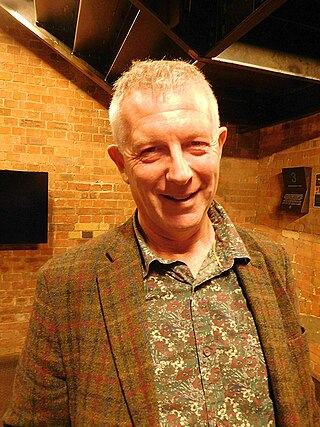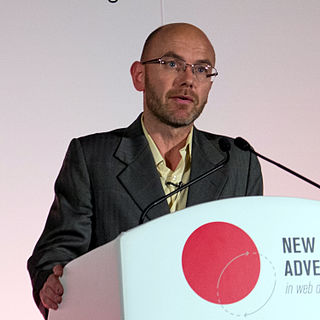
The National Trust for Scotland is a Scottish conservation organisation. It is the largest membership organisation in Scotland and describes itself as "the conservation charity that protects and promotes Scotland's natural and cultural heritage for present and future generations to enjoy".

The Pennine Way is a National Trail in England, with a small section in Scotland. The trail stretches for 268 miles (431 km) from Edale, in the northern Derbyshire Peak District, north through the Yorkshire Dales and Northumberland National Park and ends at Kirk Yetholm, just inside the Scottish border. The path runs along the Pennine hills, sometimes described as the "backbone of England". Although not the United Kingdom's longest National Trail, it is, according to The Ramblers, "one of Britain's best known and toughest".

Richard Scurrah Wainwright was a British politician of the Liberal Party. He was the MP for Colne Valley from 1966 to 1970, and again from 1974 to 1987.

Stephen Moss is a British natural historian, birder, author, and television producer.

Combat Rock is the fifth studio album by the English rock band the Clash, released on 14 May 1982 through CBS Records. In the United Kingdom, the album charted at number 2, spending 23 weeks in the UK charts and peaked at number 7 in the United States, spending 61 weeks on the chart. The album was propelled by drummer Topper Headon's "Rock the Casbah" which became a staple on the newly launched MTV. Combat Rock continued the influence of funk and reggae like previous Clash albums, but also featured a more radio-friendly sound which alienated Clash fans. While the recording process went smoothly, the producing process of the album was tiring and full of infighting between Mick Jones and Joe Strummer. Headon's heroin addiction grew worse and he slowly became distant from the band while Strummer and bassist Paul Simonon reinstated Bernie Rhodes as manager, a move unwelcomed by Jones. The band had disagreed on the creative process of the album and called in Glyn Johns to produce the more radio-friendly sound of Combat Rock. Lyrically, Combat Rock focuses on the Vietnam War, postcolonialism, the decline of American society, and authoritarianism.

Carl Steven Alfred Chinn is an English historian, author and radio presenter whose working life has been devoted to the study and popularisation of the city of Birmingham. He broadcast a programme on the BBC from the mid-1990s focusing on Birmingham's history.

Paul Gravett is a London-based journalist, curator, writer, and broadcaster who has worked in comics publishing since 1981.
Country Diary is a daily natural history column in the English newspaper The Guardian, first published in November 1906. It is also now freely available on the newspaper's website. Past and present contributors include Pete Bowler, Arnold Boyd, Mark Cocker, Thomas Coward, Harry Griffin, Jim Perrin, Sarah Poyntz, Arthur Ransome, Enid J. Wilson, Simon Ingram and Paul Evans.

Sir Michael Andrew Bridge Morpurgo is an English book author, poet, playwright, and librettist who is known best for children's novels such as War Horse (1982). His work is noted for its "magical storytelling", for recurring themes such as the triumph of an outsider or survival, for characters' relationships with nature, and for vivid settings such as the Cornish coast or the trenches of the First World War. Morpurgo was the third Children's Laureate, from 2003 to 2005, and is President of BookTrust, a children's reading charity.

John Martin Robinson FSA is a British architectural historian and officer of arms.

Wayne Andrew Hemingway is an English designer and co-founder of Red or Dead. He is also on the Design Council Trustee Board and having been with the Commission for Architecture and the Built Environment (CABE) for a decade since its inception is now on the Design Council CABE Committee. Hemingway is a Professor in The Built Environment Department of Northumbria University, a Doctor of Design at Wolverhampton, Lancaster and Stafford, a Fellow of Blackburn College and a Senior Fellow of Regent's University London.
Clive Aslet is a writer on British architecture and life, a Visiting Professor of Architecture at the University of Cambridge and publisher of Triglyph Books. For 13 years he was the Editor of Country Life magazine.
Country Life books are publications, mostly on English country houses and gardens, compiled from the articles and photographic archives of Country Life magazine, usually published in the UK by Aurum Press and in the USA by Rizzoli.
Jeremy Musson is an English writer, editor and presenter, specialising in British country houses and architecture.

Luke Daniel Harding is a British journalist who is a foreign correspondent for The Guardian. He is known for his coverage of Russia under Vladimir Putin, WikiLeaks and Edward Snowden.

Marie Hartley was writer or co-writer and illustrator of some 40 books on the social history of the Yorkshire Dales.
Chris Jesty is a British author and cartographer who revised Alfred Wainwright's Pictorial Guide to the Lakeland Fells to produce the second edition (2005–2009) of the books, which were originally published in 1955–1966. He used GPS to survey all the routes and the work involved 3,000 hand-drawn changes in the first volume alone, reflecting changes such as walls having fallen down or a quarry being opened on the line of a footpath, and adding information such as car parking.
Oliver Wainwright is a British architecture and design critic. He has written for the British newspapers The Guardian and The Times and is the Features Editor for the industry magazine Building Design. He trained and worked as an architect before becoming a journalist

Kate Miriam Granger was an English geriatrician and campaigner for better patient care. In 2011 she was diagnosed with desmoplastic small-round-cell tumor (DSRCT), a type of sarcoma, and subsequently started the "#hellomynameis" campaign encouraging healthcare staff to introduce themselves to patients. Granger also raised over £250,000 for local cancer charity, the Yorkshire Cancer Centre Appeal.

Joan Alicia Ingilby MBE was a British poet, historian and collector. Her books recorded life in the Yorkshire Dales and she was a co-founder of a museum founded on the artefacts that she and Marie Hartley had collected.













